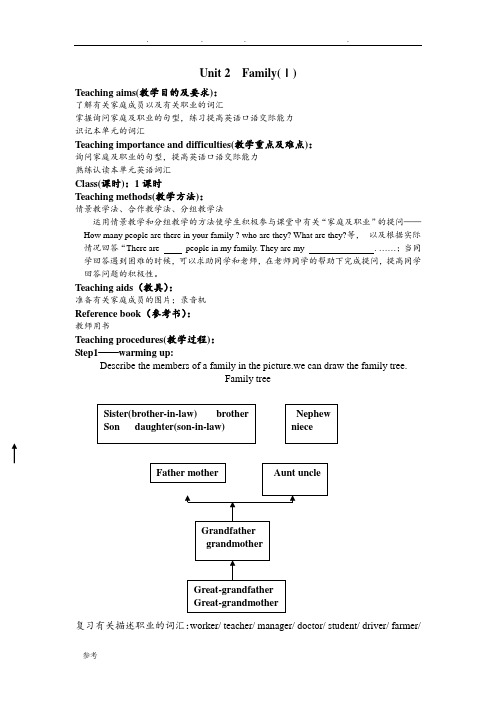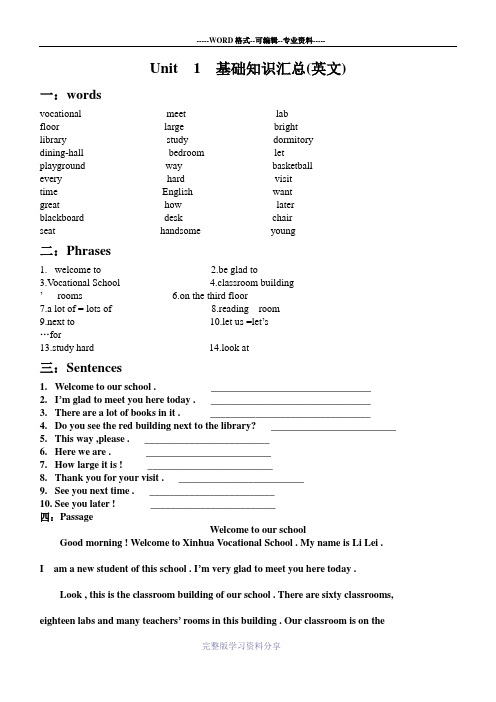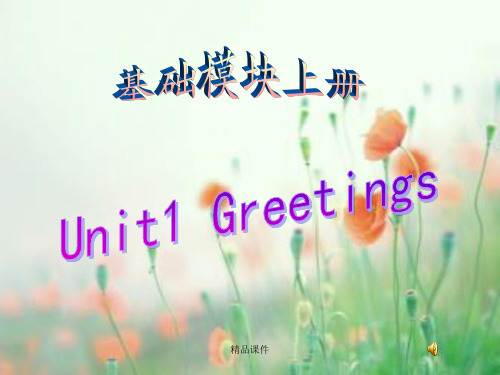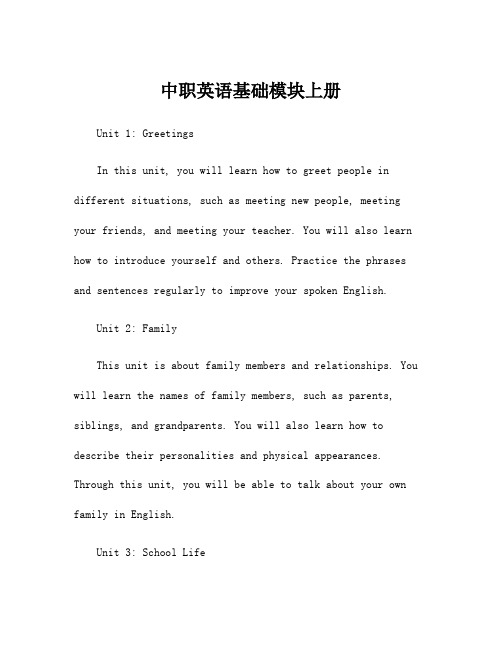职业高中英语基础模块上册
中职英语基础模块((上册))unit_

Unit 2 Family(Ⅰ)Teaching aims(教学目的及要求):了解有关家庭成员以及有关职业的词汇掌握询问家庭及职业的句型,练习提高英语口语交际能力识记本单元的词汇Teaching importance and difficulties(教学重点及难点):询问家庭及职业的句型,提高英语口语交际能力熟练认读本单元英语词汇Class(课时):1课时Teaching methods(教学方法):情景教学法、合作教学法、分组教学法运用情景教学和分组教学的方法使学生积极参与课堂中有关“家庭及职业”的提问——How many people are there in your family ? who are they? What are they?等,以及根据实际情况回答“There are people in my family. They are my . ……;当同学回答遇到困难的时候,可以求助同学和老师,在老师同学的帮助下完成提问,提高同学回答问题的积极性。
Teaching aids(教具):准备有关家庭成员的图片;录音机Reference book(参考书):教师用书Teaching procedures(教学过程):Step1——warming up:Describe the members of a family in the picture.we can draw the family tree.Family tree复习有关描述职业的词汇:worker/ teacher/ manager/ doctor/ student/ driver/ farmer/nurse/policeman/ engineer…练习询问有关家庭及家庭成员职业的简单句:How many people are there in your famiy?There are .Who are they ?They are .What are they?My father is a ;my mother is a ; my brother isa ;……Divide into groups to make oral practice with above useful expressions .Step 2——new words and expressions⑴be kind to …“对…和蔼可亲”be friendly to …“对…友好”eg:Our teacher is very kind/friendly to us.⑵enjoy doing …喜爱做…Eg: I enjoy listening to music.enjoy oneself 玩的高兴,过的愉快Eg:Are you enjoying yourself?⑶live with 与…一起生活Eg:I live with my family.⑷together withEg: I’ll go shoping together with my friends.⑸also adv. 也,同样Eg:He also asked to go.He has made up his mind to go to the countryside, and I also.与too 的区别Eg:I was there and he was there too.还有as well/either:Eg: I like you as well.I don’t like him either.总结also 用于肯定句的句中too/as well 用于肯定句句尾either 用于否定句句末⑹be popular with 受…的欢迎Eg:This singer is popular with young people.⑺on the right/left ofEg: I sit on the right/left of him.⑻be full ofEg: our class is full of love and warmth.Her eyes are full of tears.Step 3——Read the new words and expressions over times folling the tapes.Homework :(分层次作业)1、To remember the new words and expressions.2、To preview the “Family”,complete the Reading Comprehension on page 12 intextbook.Blackboard design:( 板书设计)Unit 2 Family1、Family treeJobs :Useful expressions:How many people are there in your famiy?There are .Who are they ?They are .What are they?My father is a ;my mother is a ; my brother isa ;……2、new words and expressions⑴be kind to …“对…和蔼可亲”be friendly to …“对…友好”⑵enjoy doing …喜爱做…enjoy oneself 玩的高兴,过的愉快⑶live with 与…一起生活⑷together with⑸also adv. 也,同样与too 的区别还有as well/either:总结also 用于肯定句的句中too/as well 用于肯定句句尾either 用于否定句句末⑹be popular with 受…的欢迎⑺on the right/left of⑻be full ofTeaching reflection:(教学后记)1、要求每个同学都能按照板书上的交际用语根据实际情况回答问题,提高同学的口语交际能力。
中职《英语 基础模块》上册 Unit 2 Family

are! I love you.
Language & Culture Press
Teaching Procedures
2. Reading
1. Lead in
2. Reading
Unit 42
3. Listening & Speaking
4. Summary 5. Homework
Language & Culture Press
1
Pre-reading activity
2
While-reading activity
3
Post-reading activity
1 Pre-reading activity
Activity 1
Who is she /he ?
She is a/an…
Father
Mother Uncle Aunt Grandpa
Activity 2 True or false:
1. My grandfather is over seventy.
4
5
4. Summary
5. Homework
Language & Culture Press
Teaching Procedures
1. Lead in
This is my… He / She is a …
Unit 42
Language & Culture Press
最新中职英语基础模块上册Unit-2

MY FAMILY
• Who?
grandfather and grandmother
• What ? retired workers
• How old? over seventy
• How? kind \help
MY FAMILY
• Who?
father
• What ? manager
• How old? forty-five years old
• How? hard working
MY FAMILY
• Who?
mother
• What ? teacher
• How old? forty-five years ld
• How? Lively/interesting/popular
MY FAMILY
• Who?
uncle
• What ? student
• ⑶live with 与…一起生活
• Eg:I live with my family.我与我的家人一起生活
• ⑷ together with连同.......
• Eg: I’ll go shoping together with my friends. 我和我的朋友一起去买东西
• My father stands behind my grandfather. He is forty‒ • five years old. He is a manager at a company and he • is a hardworking man. Behind my grandmother is my
pular with her students.
• ⑸also adv. 也,同样 • Eg:He also asked to go. 他还去问
职高英语基础模块上册-Unit-1-(English)

Unit 1 基础知识汇总(英文)一:wordsvocational meet labfloor large brightlibrary study dormitorydining-hall bedroom letplayground way basketballevery hard visittime English wantgreat how laterblackboard desk chairseat handsome young二:Phrases1.welcome to2.be glad to3.V ocational School4.classroom building’rooms 6.on the third floor7.a lot of = lots of 8.reading room9.next to 10.let us =let’s…for13.study hard 14.look at三:Sentences1.Welcome to our school . ________________________________2.I’m glad to meet you here today . ________________________________3.There are a lot of books in it . ________________________________4.Do you see the red building next to the library? _________________________5.This way ,please . _________________________6.Here we are . _________________________7.How large it is ! _________________________8.Thank you for your visit . _________________________9.See you next time . _________________________10.See you later ! _________________________四:PassageWelcome to our schoolGood morning ! Welcome to Xinhua Vocational School . My name is Li Lei .I am a new student of this school . I’m very glad to meet you here today .Look , this is the classroom building of our school . There are sixty classrooms, eighteen labs and many teachers’ rooms in this building . Our classroom is on thethird floor . It is large and bright . There are fifty students in our class . Thatbuilding is the school library .It is a new building . There are a lot of books init .There are four reading rooms in the library .We can read and study in the readingrooms after class . Do you see the red building next to the library ?That is thestudents’ dormitory .There is a large dining-hall and many bedrooms in it .Now let’sgo to the playground of our school .This way , please .Oh, here we are ! How largeit is ! Many students play basketball and football here after class every day .Our school is a very good school . We love our school . We all study hard here .Well, thank you for your visit . See you next time .Complete the blanks :完形填空Welcome to Center Street. Center Street is a great place to enjoy ___ 1 ___ .There are ____ 2 ____ stores and shops on it. It is a very ___ 3 ____ street. If you want to ____ 4 ___ you can go to the video arcade. It is ___ 5 ___ from the big supermarket. There is also a new park ___ 6 ___ the supermarket. It is ___7 ___ and quiet. You can ____8 ___ your picnic(野餐) in it. If you want to see ___9 ___,you can go to the movie house. It is ____10 __ the supermarket and the park.1 B.you2A.lot of B.a lots C.a lot of D.a lot34A.have lunch B.play games C.buy clothes D.see animals5 D. near678910 D.next to阅读理解。
中职英语基础模块上册(人教版)全套教案

中职英语基础模块上册(人教版)全套教案教案一:Unit 1 - Greetings and Introductions教学目标- 研究并掌握基本的打招呼和自我介绍的表达方式- 学会用英语讨论日常生活中常见的话题教学重点- 掌握英语中的基本打招呼用语,如"Hello"、"Good morning"等- 学会用英语进行自我介绍,包括姓名、年龄、家庭信息等- 研究常见的日常用语,如问候、介绍等教学内容1. 研究并模仿基本的打招呼用语,如:- "Hello"- "Good morning"- "How are you?"2. 研究并模仿基本的自我介绍用语,如:- "My name is [name]."- "I am [age] years old."- "I live in [place]."3. 进行角色扮演,练打招呼和自我介绍的对话。
4. 研究并模仿常见的日常用语,如:- "Nice to meet you."- "Where are you from?"- "What do you like to do in your free time?"教学方法- 师生互动:通过师生问答、角色扮演等方式,进行实际口语练。
- 录音练:请学生录制并回放自己的自我介绍,进行口语语音纠正。
教学评估与反馈- 老师对学生进行口语表达的纠正和评估。
- 学生之间互相评价和反馈。
教案二:Unit 2 - Daily Routines教学目标- 研究并掌握日常生活中的常见动词和词组- 能够描述自己和他人的日常活动安排教学重点- 掌握英语中常见的动词和词组,如"get up"、"have breakfast"等- 学会用英语描述自己和他人的日常活动安排教学内容1. 研究并模仿常见的日常活动动词,如:- "get up"- "have breakfast"- "go to school"2. 研究并模仿描述日常活动的句子,如:- "I get up at 7 o'clock in the morning."- "She has breakfast with her family."3. 进行角色扮演,练描述日常活动安排的对话。
职高英语基础模块上Unit1

desk
n.
seat
man
n.时间
time
adv.稍后 vocationa
adj.职业的 llarge
高兴的 nice
adj.大的 great
adj.明亮的 young
adj. 好的
adj.下次的
adj.伟大的 潇洒的
classroom baufitledrincglass
adj.年轻的 每一
精品课件
New Words and Expressions
v.欢迎 welcome v.遇见 look
v.看;瞧 study
v.读 let
v.学习 love v.看见
visit
v.让
v.玩
精品课件
meet read see play thank
want
n.建筑物 building
建造 classroom∕u
4. The boys are going to lpllay ________ (篮球
教室里有两位学生和一精品名课件老师。
1. Hello, John! WelcomeB _____ Shijiazhuang!
A. at A B. to
C.
in
D. /
2. I’ll be glDad ____ with you.
A. to go B. going
C. go
3.
D. My
hgoonuseeCis
building. ry
vocationa
2. She graduated froml a _________ (职业的)
school in 2008.
visit
中职英语基础模块上册Unit-2

Match the words in Box A with the words in Box B.
A
• Grandmoth er
• Grandfathe r
• Father • Mother • uncle
B
• teacher • retired worker • manager • student
3)指示代词: 指示说明近处或者远处、上文或 者下文、以前或者现在的人或事物。
• 指示代词既可以单独使用做句子的主语、宾语或表语,也可以 作定语修饰名词。
• 如:
• What’s this?(这是什么?) • That model plane is made of plastic.(那只模型飞机是塑料做的) • (被动句) • Remember never to do such things.(记得永远不要做这样的事情
• ⑹ be popular with 受…的欢迎
• Eg:This singer is popular with young people.
•
这个歌手很受年轻人的欢迎
• On the right of my father stands a handsome Young ma n, tall and thin. He wears a blue T‒shirt and looks rathe r cool. He is my uncle. He is a student at a
中职英语基础模块上册

中职英语基础模块上册Unit 1: GreetingsIn this unit, you will learn how to greet people in different situations, such as meeting new people, meeting your friends, and meeting your teacher. You will also learn how to introduce yourself and others. Practice the phrases and sentences regularly to improve your spoken English.Unit 2: FamilyThis unit is about family members and relationships. You will learn the names of family members, such as parents, siblings, and grandparents. You will also learn how to describe their personalities and physical appearances. Through this unit, you will be able to talk about your own family in English.Unit 3: School LifeIn this unit, you will learn school-related vocabulary and phrases. You will learn the names of school subjects, school facilities, and school activities. You will also learn how to talk about daily routines and school events. The goal is to enable you to communicate about your school life confidently.Unit 4: HobbiesThis unit focuses on discussing hobbies and interests in English. You will learn how to express your likes and dislikes, as well as talk about your hobbies. You will also learn how to ask others about their hobbies and interests. By the end of this unit, you should be able to have conversations about hobbies with others.Unit 5: Daily RoutinesIn this unit, you will learn how to talk about your daily routines and activities. You will learn the vocabulary for daily activities, such as waking up, bathing, eating meals,and going to bed. By mastering the content of this unit, you will be able to describe your typical day to others.Unit 6: Plans and SchedulesThis unit will teach you how to discuss future plans and schedules in English. You will learn vocabulary related to making plans, scheduling events, and discussing future activities. You will also learn how to use time-related expressions to talk about future events. After completing this unit, you should be able to make plans with others and talk about your future schedule confidently.Overall, the Basic Module of Junior Vocational English covers essential topics for daily communication. It aims to equip learners with the necessary language skills to communicate effectively in various social and work-related situations. Regular practice and review of the content is crucial for mastering the material.。
- 1、下载文档前请自行甄别文档内容的完整性,平台不提供额外的编辑、内容补充、找答案等附加服务。
- 2、"仅部分预览"的文档,不可在线预览部分如存在完整性等问题,可反馈申请退款(可完整预览的文档不适用该条件!)。
- 3、如文档侵犯您的权益,请联系客服反馈,我们会尽快为您处理(人工客服工作时间:9:00-18:30)。
Unit10一、语音知识:从 ABCD 四个选项中找出其划线部分与所给单词划线部分读音相同的选项。
( )1. fashion A. flame B. ancient C. battle D. name( )2. private A. distance B. title C. spirit D. kilometer( )3. holiday A. soldier B. hold C. story D. cold( )4. cold A. glory B. exhausted C. Olympic D. story( )5. wear A. hear B. swear C. clear D. near二、词汇与语法知识:从 ABCD 四个选项中选出可以填入空白处的最佳选项( )6. She is ______ a lovely girl that we all like her very much.A. soB. suchC. tooD. enough( )7. You have ______ little money that you can’t afford to buy _____ a big house.A. so; soB. such; suchC. so; suchD. such; so( )8. Don’t do it like this _____ next time.A. any longB. no moreC. no longerD. any more( )9. Do you know who ______ the gold medal?A. wonB. winC. defeatD. defeated( )10. As we all known, Japan lies _____ the east of China.A. inB. onC. toD. at( )11. ---How often do you write to your sister?---_______A. Twice a monthB. Second times a monthC. Second a time a monthD. A second time a month( )12. “Not all the students can understand the teacher in class” means _____.A. All the students can’t understand the teacher in classB. None of the students can understand the teacher in classC. No students can understand the teacher in classD. All the students understand the teacher in class( )13. Do you want to ______ part in the game?A. joinB. takeC. join inD. joined( )14. When did your brother _____ the army?A. joinedB. join inC. take part inD. join( )15. People put vegetables in the bridge in order to _____ them fresh.A. keepB. stayC. makeD. let( )16. There is a stone bridge _____ the river.A. overB. aboveC. atD. On( )17. The Great Wall runs _____ north China like a huge dragon.A. overB. onC. crossD. across( )18. She was angry _____ the damage, and _____ the driver for having caused it. A. at; at B. at; with C. with; with D. with; at( )19. Your composition is good ______ a few mistakes here and there.A. besidesB. exceptC. except forD. except that( )20. He decided to visit the family ______ Friday night.A. atB. inC. onD. Over( )21. A battle _____ the Persians and the Greeks happened.A. betweenB. amongC. fromD. for( )22. When he _____ the mountain at last, he was out of breath.A. reached toB. arrived toC. gotD. got to( )23. _____ great joy, they rushed to the street.A. AtB. WithC. ByD. Under( )24. He thought over and over and at last a good idea _____.A. comes outB. came onC. comes upD. came along( )25. She is ______ silent girl that she seldom talks.A. suchB. such aC. such anD. so( )26. Sorry, all the tickets _____.A. has sold outB. have sold outC. has been sold outD. have been sold out( )27. Sorry to keep you _____ for so long outside.A. waitB. waitedC. waitingD. to wait( )28. He has been a taxi driver ______ he resigned (辞职).A. afterB. sinceC. fromD. when( )29. _____ while the iron is hot.A. StrikeB. HitC. BeatD. Fight( )30. I can’t _____ his name.A. callB. recallC. callingD. recalling三、完形填空:阅读下面的短文,从所给的 ABCD 四个选项中选出正确的答案。
31 you are traveling abroad, it is important 32 the customs of the country you are visiting. If you are invited to a home in Britain, here is some advice. As soon as you 33 , it is good manners to refuse or accept the invitation, either by writing 34 by telephoning. When you go to a 35 , it is polite to arrive on time. It is good manners to 36 with your host and any other guests. You can 37 a present, if you like, possibly a bottle of wine, a box of chocolates or some flowers. 38 , it is bad manners to take nothing. It is not polite to stay too late after the other guests 39 . Of course, it is good manners to write or telephone a day or two 40 to thank your host.( ) 31. A. after B. when C. before D. Though( ) 32. A. follow B. follows C. to follow D .followed( ) 33. A. are invited B. are inviting C. are visited D. are visiting( ) 34. A. but B. and C. nor D. Or( ) 35. A. party B. meeting C. shop D. hotel( ) 36. A. shake hands to B. shake hands C. look at D. laugh at( ) 37. A. take B. make C. hold D. pay( ) 38. A. also B. so C. however D. and( ) 39. A. go B. come C. have come D. have gone( ) 40. A. lately B. latest C. later D. late四、阅读理解:阅读下列短文,从每题所给的 ABCD 四个选项中,选出最恰当的答案。
AWhen I lived in England, an English woman was so warm-hearted that she often helped me. Once I wanted to go shopping, she volunteered to be my guide. I was moved a lot and wanted to say thanks to her. So I said, “Thank you! Thank you!” she was too surprised to say any words. After a while, she seemed to understand me and laughed and said “I can swim!”Suddenly I realized I had made a big mistake in my pronunciation. It was one of the funniest mistakes I had made in England. I pronounced “thank” into “sank” by mistake. English people have problems too when they learn foreign languages. Once an English friend of mine was in Paris, when a waiter wanted to serve him some more coffee, he said “Thank you” in French. He meant that he would like some more. However, to his surprise the coffee pot was taken away! Later he found out that “thank you” in French means “No, thank you.”( ) 41. When the author said thanks to her, why was the woman too surprised to say any words?A.Because she was too glad to say any words.B. Because she was a dumb.C. Because she couldn’t hear what the author said.D. Because the author pronounced “thank you” into “sank you!”( ) 42. Which sentence is true according to the passage?A. The author is an English woman.B. The author is a Frenchman.C. The author is not English, and his English pronunciation is not good.D. The author is English, but his English pronunciation is very poor.( ) 43. What is the main idea of the passage?A. English is hard to learn.B. French is hard to learn.C. Any foreign language is hard to learn.D. It is unavoidable for anyone to have problems in speaking a foreign language. ( ), when a waiter wanted to offer a guest more coffee in Paris and the guest said “Thank you”in French, the guest______.A. didn’t want any more coffeeB. wanted them to take the coffee pot awayC. really wanted some more coffeeD. wanted to express his politeness( ) the passage, the Englishman was surprised when the coffee pot was taken away when he said “thank you” to the waiter, because he ______.A. hadn’t finished drinking his coffeeB. was expecting another cup of coffeeC. meant that he didn’t want any moreD. was never misunderstoodBAs many as 10of the 17 kinds of penguins(企鹅)may be in danger of disappearing. The number of penguins has decreased by 30% since 1987.Penguins are black and white birds that live in the southern part of the world. They are common in South America, New Zealand, Australia and South Africa. Many live near cold waters. But some live near warm waters in Galapagos Islands. Penguins cannot fly, but they are fine swimmers. Penguins eat fish and krill.The warming of the earth is the cause of the decrease in penguin populations. The heating of the air has caused ocean waters to become warmer. Higher water temperatures have reduced the supply of fish and krill. Some years later these birds are completely unable to reproduce. Besides, many adult penguins die of hunger.Widespread fishing, exploration for oil and oil leaks also make penguins be in danger. Poisonous organisms in ocean water are another danger. Penguins also have their enemies, including wild dogs, sharks, seals and sea lions.News about penguins is not all bad. However, several years ago,oil leaking from a ship hurt 40% of the penguins in South Africa. The penguins became covered with oil. But thousands of people helped clean and treat the birds well. Then they returned the penguins to the wild. Now these South African penguins are reproducing in higher numbers than before the oil leaking.( ) ___________ .A. can swim better than flyB. can be found near OceaniaC. eat fish onlyD. live only in cold waters( ) 47. Which of the following is not the cause of penguin’s decrease in numbers?A. Oil searching.B. Widespread fishing.C. Human’s killing.D. Warming of the oceans.( ) 48. Why are the penguins in South Africa reproducing in higher numbers than before the oil leaking?A. Because people removed the ship.B. Because people sent a lot of penguins to the wild.C. Because people helped the penguins.D. Because people treated the penguins well. ( ) 49. Which sentence is true according to the passage?A. All kinds of penguins are in danger of disappearing.B. Penguins are birds that live in the northern part of the worldC. The warming of the earth is the cause of the decrease in penguin populationsD. No news about penguins is bad( ) 50. Please choose the best title for the passage.A. Protecting Our EnvironmentB. About PenguinsC. Ocean is Important for PenguinsD. How to Protect the Wild AnimalsCNew Zealand is located in the South Pacific Ocean over 1,000 miles southeast of its nearest neighbor, Australia. It consists of two main islands -- the North Island and the South Island and a number of little islands, some of which are hundreds of miles away from the main group. Its population in the early 1970s was almost 2,900,000. The land area covers over 260,000 square kilometers. About two-thirds of the land is economically developed or developing, the rest being mountainous, especially good for tourism.Since the Second World War there have been great changes in culture and in the arts of New Zealand. These changes have much to do with the improvement of education. Today, artists, musicians and writers have a much wider public than before. Far more people now read books and go to the theaters, concerts, picture galleries and fashion shows.New Zealanders have been known as great art collectors. Their collections can be seen today in museums, and in picture galleries in many cities which are open to the public. A few artists have been very successful and have had their works accepted by well-known art galleries all over the world.Because of its rich cultural and natural resources, tourism in New Zealand has been growing rapidly. Now there are about 900 thousand visitors from all parts of the world every year. The Green Precious Stone in the South Pacific has become one of the most attractive places for tourists today.( ) 51. New Zealand is a country lying_____.A.in AsiaB. in the PacificC. southwest of AustraliaD. in the north part of the earth ( ) 52. New Zealand is a country with_____.A. a large area and a large populationB. a small area and a large populationC. a large area and a small populationD. a small area and a small population( ) 53. Cultural development in New Zealand is mainly related to_____.A. the end of the Second World WarB. its unique locationC. its development in educationD. its great art collectors( ) 54. The reason why tourism is growing rapidly is that_____.A. New Zealand has rich cultural and natural resourcesB. New Zealand has many art collectorsC. more New Zealanders now go to the theaters, concerts, galleries and fashion showsD. one-third of New Zealand is mountainous( ) 55. The Green Precious Stone is actually_____.A. a precious stoneB. a piece of green jadeC. an attractive scenic place in New ZealandD. New Zealand itself五、词义搭配:从 B 栏中选出 A 栏单词的正确解释。
